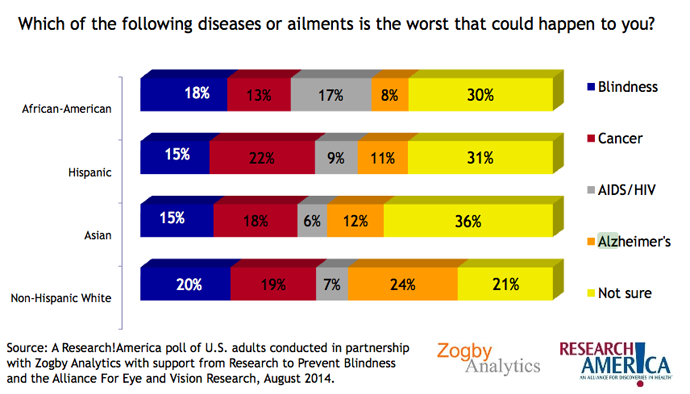Would you rather go blind or lose your mind?
Americans consistently fear blindness, but how they compare it to other ailments varies across racial lines

A free daily email with the biggest news stories of the day – and the best features from TheWeek.com
You are now subscribed
Your newsletter sign-up was successful

One morning in college, James Jorkasky woke up and couldn't see out of his left eye. A vessel near the eye's optic nerve had leaked, and his vision was blocked by blood.
"I didn't know what was going to happen," he says. "I was getting ready to start my senior year. I was pre-med. The first thing I thought was that my life was over."
Fortunately, the leak healed. Jorkasky's vision returned, and he quickly jumped back into his studies. But the incident stuck with him. Now the executive director of the National Alliance for Eye and Vision Research, he says the fear he felt that morning motivated him to support vision health because he realized how difficult life would be without it.
The Week
Escape your echo chamber. Get the facts behind the news, plus analysis from multiple perspectives.

Sign up for The Week's Free Newsletters
From our morning news briefing to a weekly Good News Newsletter, get the best of The Week delivered directly to your inbox.
From our morning news briefing to a weekly Good News Newsletter, get the best of The Week delivered directly to your inbox.
NAEVR and Research to Prevent Blindness recently sponsored a national poll of Americans' attitudes toward blindness. Conducted online by Research!America, a non-profit health research advocacy organization, the poll aimed to encourage Congress to boost funding for vision research (which vision health advocates say is desperately needed). Some of the poll's questions were softballs — is the $2.10-per-person average the federal government spends annually on vision research enough? — but one of its openers posed an anxiety-inducing hypothetical:
Which of the following diseases or ailments is the worst that could happen to you: blindness, cancer, AIDS/HIV, or Alzheimer's?
This question is killer because it demands a choice among absolute worst-case health scenarios, all with dramatically different manifestations. What's better: a potentially debilitating illness, a slow slip into dementia, or an illness-free life without sight? Unsurprisingly, close to 30 percent of the survey's 2,044 respondents replied "not sure."
The divisions among those who committed to an ailment are telling, though. On average, respondents split even between cancer, Alzheimer's, and blindness — around 20 percent each. AIDS/HIV was least threatening, at about 10 percent. The numbers change, however, when respondents are grouped by race. For instance, 8 percent of black respondents chose Alzheimer's and 17 percent chose AIDS/HIV as the worst possible outcome, while 24 percent of white respondents chose the former and only seven percent chose the latter. Hispanics feared cancer the most, at 22 percent.
A free daily email with the biggest news stories of the day – and the best features from TheWeek.com

Anna Briseno, a Research!America spokesperson, says these results seem to model "the knowledge base and prevalence of diseases among the different racial and ethnic groups." Alzheimer's could seem like the obvious choice because it's the only death sentence on the list, but for black people, who suffer disproportionately from HIV, AIDS may seem like the much more immediate threat.
Across races, Americans still consistently are petrified of blindness, though. While it's the only ailment on the list that couldn't kill you, Jorkasky isn't surprised. He points to a study of diabetics with vision loss who said they'd trade years of their life for perfect sight.
"People want to be as independent as possible," he says. "When you ask them about being blind, they start thinking about how they couldn't live their lives in the way they'd like to, what they couldn't do."
Pacific Standard grapples with the nation's biggest issues by illuminating why we do what we do. For more on the science of society, sign up for its weekly email update or subscribe to its bimonthly print magazine.
More from Pacific Standard...
-
 Switzerland could vote to cap its population
Switzerland could vote to cap its populationUnder the Radar Swiss People’s Party proposes referendum on radical anti-immigration measure to limit residents to 10 million
-
 Political cartoons for February 15
Political cartoons for February 15Cartoons Sunday's political cartoons include political ventriloquism, Europe in the middle, and more
-
 The broken water companies failing England and Wales
The broken water companies failing England and WalesExplainer With rising bills, deteriorating river health and a lack of investment, regulators face an uphill battle to stabilise the industry